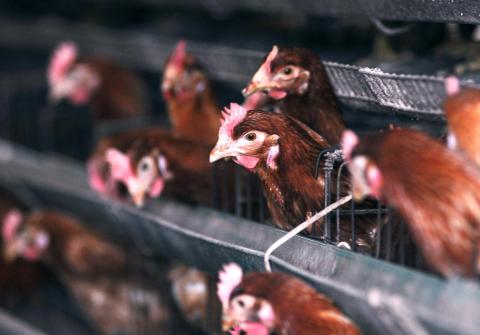Chinese health authorities on Saturday confirmed three cases of a strain of avian flu that had not been found in humans before.
Two of the patients have died in Shanghai and one is still critically ill in Anhui Province, the Centers for Disease Control (CDC) said yesterday.
CDC Deputy Director-General Chou Jih-haw (周志浩) said that 88 people have had close contact with the three patients, but the Chinese health agency said that so far they have not displayed any symptoms.

Photo: AFP
Chou said that although three human cases of H7N9 infection have been confirmed, it is still not clear whether this strain of avian influenza can be transmitted though human-to-human contact.
“In Taiwan, we used to find H7N3 and H7N7 virus infections in poultry, but that has not been the case with H7N9,” Chou said. “The CDC has tested more than 3,000 cases of influenza infection since October last year, but has yet to find any cases of the H7N9 virus. Of the 136 cases of unexplained pneumonia investigated, three were found to be H3N2 and one H1N1; again none tested positive for H7N9.”
Although most avian influenza viruses do not affect people, some do. One of these is H5N1, a highly pathogenic avian influenza virus.
“As of March 4, WHO data showed that there have been 622 confirmed cases of H5N1 infection, as a result of which 371 people died, amounting to a mortality rate of almost 60 percent,” Chou said.
The CDC said it has stepped up inspections and monitoring of people arriving from China, Hong Kong and Macau. Those who develop symptoms of infection or have been in contact with poultry are to be sent to hospitals to be tested for the virus and not discharged until cleared of infection.
In addition, he said that people who plan to travel to China “should avoid any form of contact with poultry and if they have developed any of the above-mentioned symptoms, they should inform officials at ports of entry when they return.”
CDC Director-General Chang Feng-yi (張烽益) told a legislative hearing that while Taiwan has no recorded cases of human H7N9 infections, precautionary measures have been stepped up in light of the cases in China.
Immigration officials at Taiwan Taoyuan International Airport have been asked to intensify monitoring and inspection of passengers from China, Hong Kong and Macau, Chang said.
Meanwhile, the government has extended public access to subsidized anti-viral influenza drugs until the end of this month, as a precaution against a possible outbreak of the virus.
Although there is no specific vaccine against the virus, existing information shows that H7N9 infection can be treated with Tamiflu, Chang said.
The CDC has been monitoring cases of pneumonia of unknown etiology and flu-like illnesses on a regular basis, but has not detected any H7N9 infections so far, he said.

The Ministry of Foreign Affairs (MOFA) yesterday said it is closely monitoring developments in Venezuela, and would continue to cooperate with democratic allies and work together for regional and global security, stability, and prosperity. The remarks came after the US on Saturday launched a series of airstrikes in Venezuela and kidnapped Venezuelan President Nicolas Maduro, who was later flown to New York along with his wife. The pair face US charges related to drug trafficking and alleged cooperation with gangs designated as terrorist organizations. Maduro has denied the allegations. The ministry said that it is closely monitoring the political and economic situation

UNRELENTING: China attempted cyberattacks on Taiwan’s critical infrastructure 2.63 million times per day last year, up from 1.23 million in 2023, the NSB said China’s cyberarmy has long engaged in cyberattacks against Taiwan’s critical infrastructure, employing diverse and evolving tactics, the National Security Bureau (NSB) said yesterday, adding that cyberattacks on critical energy infrastructure last year increased 10-fold compared with the previous year. The NSB yesterday released a report titled Analysis on China’s Cyber Threats to Taiwan’s Critical Infrastructure in 2025, outlining the number of cyberattacks, major tactics and hacker groups. Taiwan’s national intelligence community identified a large number of cybersecurity incidents last year, the bureau said in a statement. China’s cyberarmy last year launched an average of 2.63 million intrusion attempts per day targeting Taiwan’s critical

‘SLICING METHOD’: In the event of a blockade, the China Coast Guard would intercept Taiwanese ships while its navy would seek to deter foreign intervention China’s military drills around Taiwan this week signaled potential strategies to cut the nation off from energy supplies and foreign military assistance, a US think tank report said. The Chinese People’s Liberation Army (PLA) conducted what it called “Justice Mission 2025” exercises from Monday to Tuesday in five maritime zones and airspace around Taiwan, calling them a warning to “Taiwanese independence” forces. In a report released on Wednesday, the Institute for the Study of War said the exercises effectively simulated blocking shipping routes to major port cities, including Kaohsiung, Keelung and Hualien. Taiwan would be highly vulnerable under such a blockade, because it

Conflict with Taiwan could leave China with “massive economic disruption, catastrophic military losses, significant social unrest, and devastating sanctions,” a US think tank said in a report released on Monday. The German Marshall Fund released a report titled If China Attacks Taiwan: The Consequences for China of “Minor Conflict” and “Major War” Scenarios. The report details the “massive” economic, military, social and international costs to China in the event of a minor conflict or major war with Taiwan, estimating that the Chinese People’s Liberation Army (PLA) could sustain losses of more than half of its active-duty ground forces, including 100,000 troops. Understanding Chinese